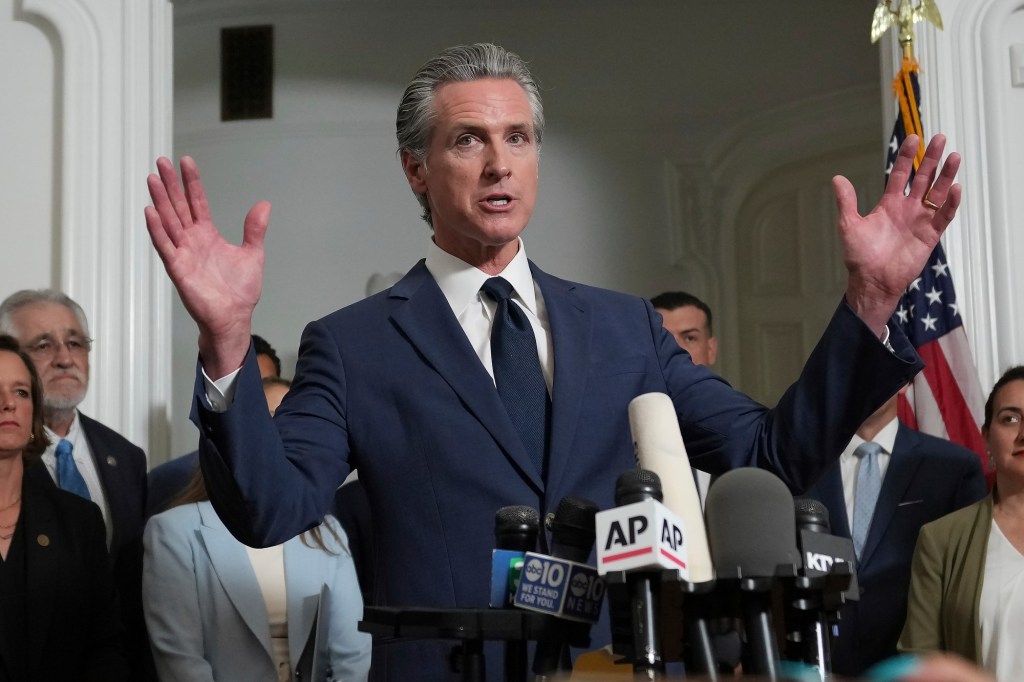
California’s jobless rate hit 5.5% in July, the highest in the country for the second straight month.
It seems a troubling rise in unemployment would be a top priority for Gov. Gavin Newsom and state lawmakers. Instead, they’re focused on redistricting.
Why is unemployment going up? A few recent headlines show how bad state policies are killing jobs.
“S.F.’s biggest mall loses another half-dozen restaurants as retail exodus builds,” the San Francisco Chronicle reported on Aug. 14, the same day the July data were released.
A day later, the Los Angeles Times announced that Playboy was leaving “Los Angeles for Miami Beach; CEO calls California ‘anti-business.’” Playboy chief executive Ben Kohn said his company is “excited to move” to “the city of Miami Beach, which has been phenomenal to deal with, very pro-business.”
Florida’s unemployment rate was 3.7% in July, below the national average of 4.2%. Texas’ jobless rate was 4% for July. Tennessee notched a 3.7% rate.
A just released National Bureau of Economic Research report found 18,000 jobs have been lost under California’s $20 restaurant minimum wage. This is what happens, says PRI Senior Fellow Wayne Winegarden, when policymakers decline to follow the facts.
“In this case the facts are clear,” Winegarden argues, the “minimum wage hike is reducing jobs and destroying the long-run opportunities enabled by a vibrant entry-level job market.”
The culling isn’t yet complete. Los Angeles City Council has approved a minimum-wage hike to $30 an hour, a significant bump over the current $17.81 per hour.
Meanwhile, Tech Times reports that “Chevron, Tesla, and Oracle Lead Wave of Companies Leaving California by 2025 Over High Costs and Regulations.”
Those companies and a long list of others have fled “citing high costs, stringent regulations, and lifestyle challenges.”
Chevron spokesman Ross Allen told Business Insider that “California policymakers have pursued policies that raise costs and consumer prices, creating a hardship for all Californians, especially those who can least afford it.”
“These policies have also made California investment unappealing compared with opportunities elsewhere in the U.S. and globally.”
His assessment has been confirmed by the Legislative Analyst’s Office. It found there was no job creation in California in the fourth quarter of 2024. The LAO further noted that hiring has slowed since summer 2022. Executives and entrepreneurs have been for some time finding that other states offer better opportunities (but government managers in California have been hiring, which does more harm to the private sector more than good).
California policymakers continue to make laws and allow regulators to contrive rules that make California a land of perdition rather than destination for enterprise because they have been captured by left-of-center interests. Their labor union supporters rammed through Assembly Bill 5, a law that wiped out livelihoods, and the minimum-wage hikes that have killed jobs; trial lawyers that target businesses have blocked reforms to curtail abusive and costly lawsuits; climate zealots demand regulation and statutes that increase the cost of living; and hard-left activists will accept nothing less than higher taxes to fund a growing welfare state.
Elected officials, eager to please these groups, and to burnish their progressive street cred, toil feverishly to give them everything they ask for. They can never get it all, but they try.
In one notable instance, antipathy toward business has led to confusion and unnecessary tension. California officials are trying to kill the fossil fuel industry in the state while simultaneously seeking a buyer for Valero Energy’s Benicia refinery near San Francisco, which is scheduled to close in April because the company no longer wants to deal with the abuse from Sacramento. It’s just one of two California refineries scheduled to close in part due to policymakers’ animosity toward this critical sector.
Until lawmakers realize that their policies have been turning the state into a minefield where jobs go to die, the state is never going to again be the economic dynamo that it once was.
Kerry Jackson is the William Clement Fellow in California Reform at the Pacific Research Institute and co-author of “The California Left Coast Survivor’s Guide.”



